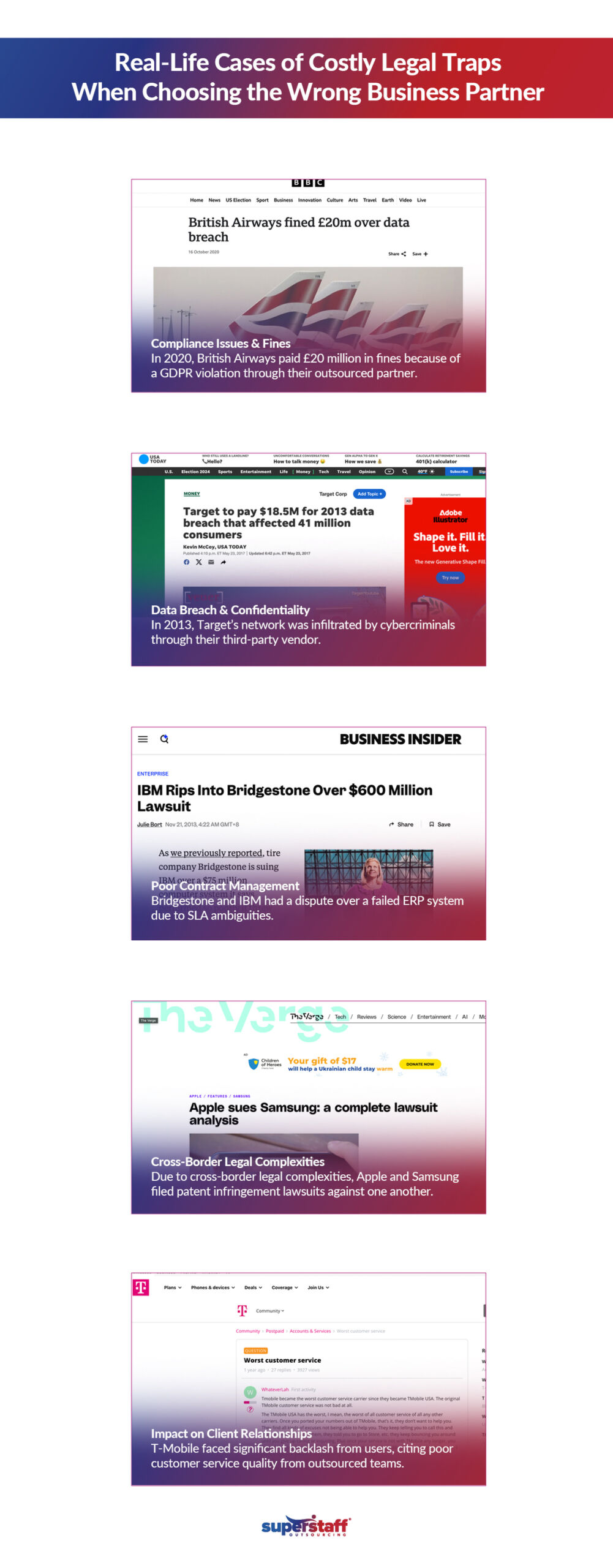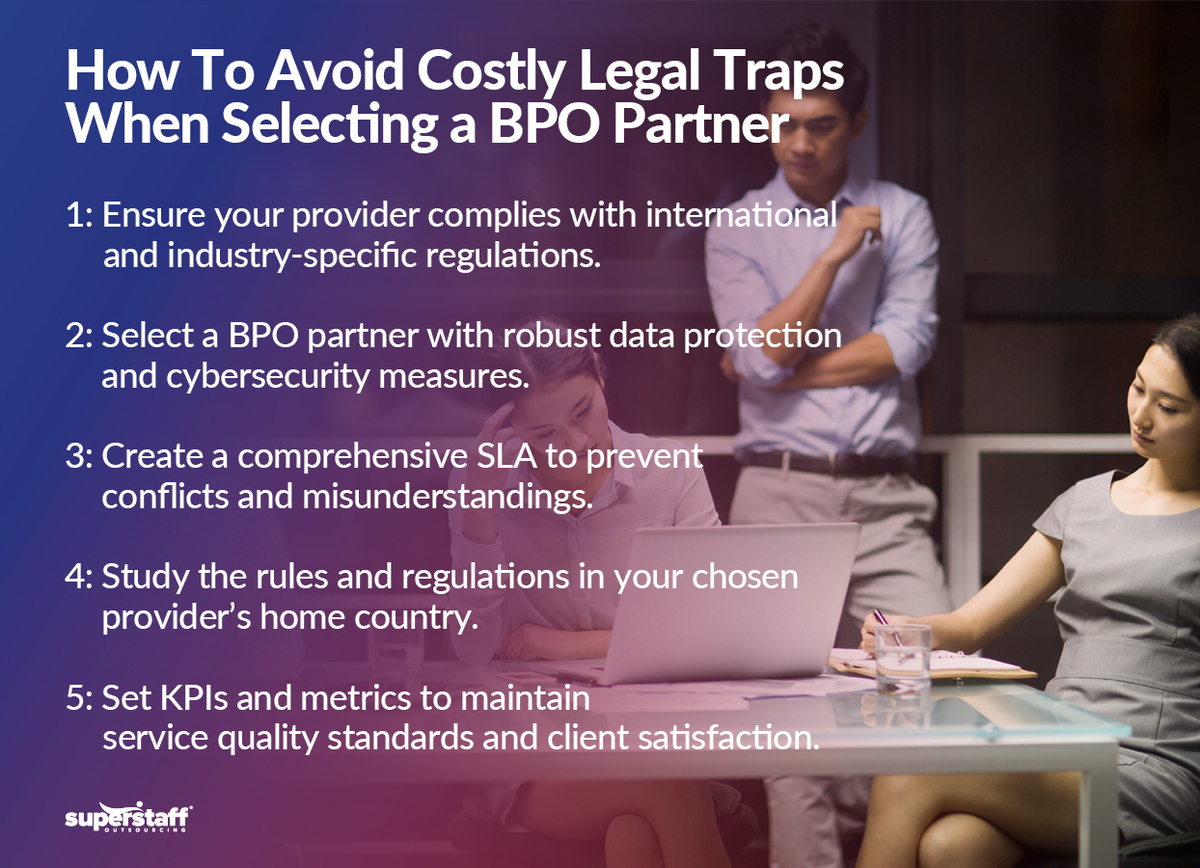
Over the past decade, outsourcing has emerged as a go-to strategy for businesses looking to scale their operations while keeping costs low. Partnering with offshore BPOs has allowed many companies to achieve their growth targets, expand their capabilities, and position themselves for long-term viability and sustainability.
The problem is that there are countless outsourcing companies in the world today, and not all of them will have your best interests at heart. When choosing the right BPO provider for your company, you must practice due diligence and thoroughly research your potential partner’s background, experience, and competence before making your final choice.
To help you make informed decisions, we’ve compiled a list of real-life cases that show what could go wrong legally when businesses choose the wrong partner. From regulatory compliance problems to data breaches and cybersecurity issues, learn from these case studies to safeguard your company and avoid costly legal complications.
Costly Legal Traps To Avoid When Selecting a BPO Provider: Learn From These 5 Real-Life Cases

Legal Compliance Issues & GDPR Fines
One of the primary considerations businesses must make when selecting a BPO provider is whether the vendor abides by national, global, and industry-specific regulations and standards. The risk of non-compliance with labor laws, data protection, and intellectual property regulations can result in heavy fines and legal disputes.
Even when you choose an offshore or nearshore outsourcing provider, you must make sure they know, understand, and follow international legal requirements, particularly when serving customers across the globe. To illustrate the importance of vetting a BPO provider for legal compliance, let’s examine the case of British Airways.
British Airways
In 2018, British Airways experienced a significant data breach, compromising the personal data of around 500,000 customers. This happened because the attackers exploited a vulnerability through their third-party supplier’s login credentials. The cybercriminals manipulated the airline’s website code to redirect sensitive customer information and payment data to a domain they controlled.
Because of its outsourced partner’s inadequate security measures and insufficient file integrity monitoring, British Airways was found to be in violation of the General Data Protection Regulation (GDPR), legislation that seeks to protect the data of EU customers. As a result, the UK’s ICO fined British Airways £20 million (proposed initially as £183 million) for GDPR violations, citing BA’s failure to safeguard personal data effectively.
The British Airways case highlights the importance of choosing BPO partners that strictly adhere to international regulations. In addition to the costly multi-million euro fines due to non-compliance, the airline’s reputation among customers was damaged during the attack.
Data Breach & Confidentiality
Another crucial consideration when choosing a BPO provider is whether they have robust cybersecurity and data protection policies in place. Without adequate data security from your outsourcing partner, your company could be vulnerable to breaches, loss of confidential information, and reputational damage.
According to a 2024 report, data breaches cost companies an average of $4.88 million, an increase of 10% compared to the previous year. The same study found that taking necessary preventive measures and precautions to avoid data breaches helped businesses save an average of $2.22 million. These numbers highlight the importance of investing in cybersecurity (and the costly ramifications of overlooking it) when choosing a dedicated BPO partner.
Target
In 2013, the retail giant Target was involved in a widespread data breach, with hackers stealing the personal and credit card information of over 70 million customers. The malicious actors gained access to this sensitive data by exploiting the weak security of Target’s HVAC contractor, Fazio Mechanical Services, sending phishing emails directly to the third-party service provider.
Then, using stolen credentials, the attackers infiltrated Target’s network and installed malware on 40,000 point-of-sale machines, capturing credit card data. The breach exposed Target’s insufficient network segmentation and oversight in choosing vendors, leading to massive lawsuits and lost customer trust, costing the company around $162 million.
Although not precisely related to a BPO provider, this high-profile data breach shows the risks of working with third-party vendors without determining whether they have stringent data security protocols. To avoid similar incidents, business leaders must research vendors thoroughly and not skip any part of the selection process.
Poor Contract Management
Upon thoroughly vetting your call center and BPO provider, the next step is to create and agree on a comprehensive Service Level Agreement (SLA). With SLAs, you and your outsourcing partner can better understand each party’s roles and responsibilities, including measurable targets, pricing and payment terms, and key performance indicators (KPIs).
Meanwhile, ambiguous or poorly defined SLAs can lead to hidden costs, conflicts, and reduced service quality, affecting business continuity. Let’s examine the case of Bridgestone and IBM to illustrate the problem of poor contract management.
Bridgestone
In 2013, Bridgestone, the multinational tire manufacturer, partnered with IBM to create and implement a new Enterprise Resource Planning (ERP) system. However, upon launch, Bridgestone claimed that IBM’s system was riddled with errors, leading to order processing failures, stockpile issues, and customer loss.
The conflict between Bridgestone and IBM arose from a failed ERP system implementation, which stemmed from their poorly defined SLAs. Bridgestone sued IBM for $600 million, citing system-wide problems that left them unable to fulfill orders and forced them to lease additional warehouse space.
Meanwhile, IBM countered that Bridgestone’s lack of governance and leadership caused the issues. This high-profile, multi-million dollar lawsuit highlights the critical need for clear contracts, leadership stability, and robust project management. If the two companies had thoroughly understood what was expected of them from the start, they would likely have avoided the massive disruptions caused by the failed ERP system and enjoyed a more seamless partnership.
Cross-Border Legal Complexities
When working with a BPO provider outside your home country, you’ll also have to deal with cross-border legal complexities. Misunderstanding jurisdictional contract differences can create significant legal challenges, impacting dispute resolution and enforcement.
As such, businesses hoping to connect with offshore and nearshore providers must familiarize themselves with the laws and regulations in their vendor’s location. To facilitate a smooth partnership, BPO partners must practice the same due diligence in understanding the legal side of serving global clients.
Apple vs. Samsung
You may be familiar with the two tech giants, Apple and Samsung, but you may not know that they once engaged in a legal battle over patent infringement. Although this case is not BPO-specific, it illustrates how cross-border legal complexities can arise between companies in different countries. Creating outsourcing contracts with inadequate jurisdictional clarity often leads to costly disputes and time-consuming legal battles.
In 2011, Apple (an American company) accused Samsung (a Korean manufacturer) of copying the design and features of its iPhone and iPad, focusing on patents related to graphical interfaces and touch interactions like “bounce-back” and “pinch-to-zoom.” They claimed that Samsung violated their intellectual property rights by creating a seemingly similar feature in their mobile devices.
Samsung counter-sued, claiming infringement on communication technology patents. Initially, the court awarded Apple $1.05 billion in damages, but the case went through multiple appeals. Ultimately, the years-long disputes led to financial settlements and emphasized differing strategies on intellectual property between the two tech giants.
Impact on Client Relationships
Finally, one final consideration businesses must keep in mind when choosing between different BPO providers is the potential impact they may have on existing client relationships. To avoid reputational damage and keep customers happy, companies must continually measure and assess their outsourced team’s performance, ensuring service quality standards are maintained and enhanced.
Let’s examine T-Mobile’s case to understand better the impact of choosing the wrong service provider on customer satisfaction and overall relationships.
T-Mobile
Over the past few years, T-Mobile made the decision to outsource its customer service to call centers outside its home country. The problem is that their chosen provider failed to resolve issues promptly, leading to a noticeable decline in customer satisfaction and, eventually, increased churn rates.
The poor service quality of T-Mobile’s outsourced team underscores the importance of selecting a reliable BPO provider with solid quality standards to maintain customer trust.
Some of the most common sentiments shared in T-Mobile forums include strong criticisms about the decreased service quality. Customers shared about feeling frustrated that the outsourced agents lacked understanding of local context and language nuances, in addition to facing prolonged resolution times.
Additionally, many consumers saw the move as a cost-cutting measure that directly impacted their customer experience. Even long-time users felt alienated and neglected by the company, leading to widespread dissatisfaction and lost loyalty among existing customers.
Find a BPO Provider That Can Help You Avoid These Costly Legal Traps

Understanding the legal complexities and consequences associated with choosing the wrong BPO provider should only be the first step of your outsourcing journey. Figuring out how to find the right partner is crucial to your company’s long-term growth and success.
For in-depth information and expert guidance on running a business, follow SuperStaff on LinkedIn or browse our website for more helpful B2B content. Our reliable BPO company has decades of experience working with companies of all sizes and industries, and we’re dedicated to sharing our knowledge with you.
To protect our clients and preserve their best interests, we invest in robust cybersecurity and data protection measures, follow local and international regulations, create comprehensive and accurate outsourcing contracts, and provide world-class customer service and BPO solutions.
If you want to take your outsourcing journey to the next level, contact us for a quick consultation today. We’ll be happy to assist you in creating tailored BPO solutions that meet your particular needs and goals!






